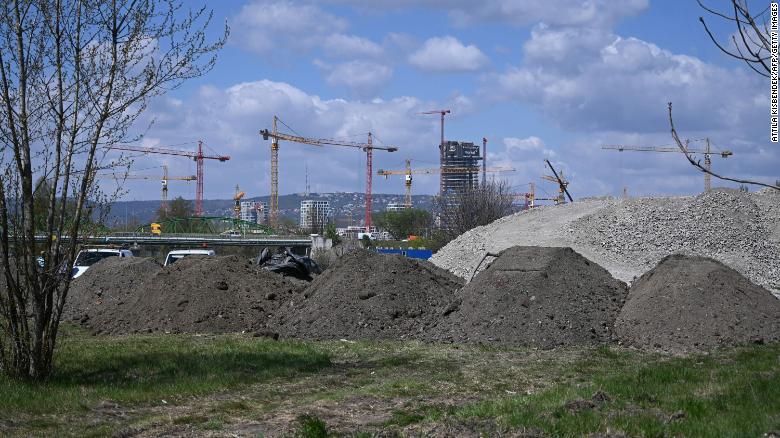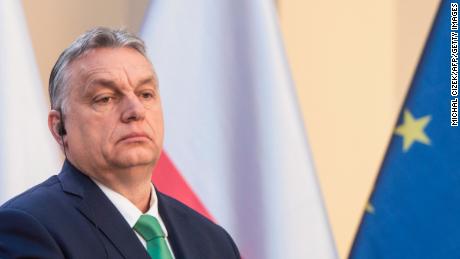
A derelict plot on the banks of the Danube River in Budapest, Hungary, might seem like an unusual epicenter for a political earthquake.But that was before Prime Minister Viktor Orbán’s populist government announced a controversial planfor a prestigious Shanghai university to open its first overseas campus there in 2024 — which Hungarians would apparently pay for.Nowprotests over the future of this nondescript sitehave galvanized Hungary’s opposition, and united them in an attempt to topple Orbán’s ruling party at next year’s general election.Since Orbán swept to power 11 years ago, there have been plenty of demonstrations in Budapest against his assault on democratic freedoms. The self-styled defender of Christian values in Europe has rolled back civil liberties, ranging from migrant and LGBTQ rights to media freedom, as well as judicial and academic independence.Not that it’s hurt Orbán’s political fortunes. His right-wing Fidesz party has enjoyed landslide election wins, with no serious political challenger outside Budapest.But the proposed Fudan University campus has become a potent issue. The Fudan campus is planned for construction at this site in Budapest, Hungary, seen on April 23, 2021.Its critics point to the huge cost to Hungary, warning that taxpayer money would be used to serve the interests of China’s Communist Party. What’s more, they say the campus would be built on land slated for affordable housing for around 10,000 Hungarian students.Thousands of protesters took to the streets in Budapest last month to opposethe plan, carrying placards emblazoned with the word “treason” and slogans such as “Hungarian money for Hungarian universities.”Orbán has made great political capital out of promoting “traditional” Hungarian values. The opposition now appears to be serving the populist leader a dose of his own medicine.The Fudan University controversy is “about whether this small country of 10 million can finally decide its own fate, about whether we will really be a free nation,” opposition leader and Budapest Mayor Gergely Karácsony told demonstrators in the capital, according to local media reports.“To an extent right now, the opposition has turned Orbán’s rhetoric against him,” said Péter Krekó, director of Budapest-based think tank Political Capital.Krekó said Orbán had adopted an image of himself as “the greatest defender of sovereignty — from the United States, from Brussels, from Berlin.”Now the Prime Minister is effectively opening the door to Chinese interests — and “that’s hard to explain” to voters, he said.”China’s image in central eastern Europe is not very favorable,” added Krekó. “This is something that can be easily exploited by the opposition.”
The Fudan campus is planned for construction at this site in Budapest, Hungary, seen on April 23, 2021.Its critics point to the huge cost to Hungary, warning that taxpayer money would be used to serve the interests of China’s Communist Party. What’s more, they say the campus would be built on land slated for affordable housing for around 10,000 Hungarian students.Thousands of protesters took to the streets in Budapest last month to opposethe plan, carrying placards emblazoned with the word “treason” and slogans such as “Hungarian money for Hungarian universities.”Orbán has made great political capital out of promoting “traditional” Hungarian values. The opposition now appears to be serving the populist leader a dose of his own medicine.The Fudan University controversy is “about whether this small country of 10 million can finally decide its own fate, about whether we will really be a free nation,” opposition leader and Budapest Mayor Gergely Karácsony told demonstrators in the capital, according to local media reports.“To an extent right now, the opposition has turned Orbán’s rhetoric against him,” said Péter Krekó, director of Budapest-based think tank Political Capital.Krekó said Orbán had adopted an image of himself as “the greatest defender of sovereignty — from the United States, from Brussels, from Berlin.”Now the Prime Minister is effectively opening the door to Chinese interests — and “that’s hard to explain” to voters, he said.”China’s image in central eastern Europe is not very favorable,” added Krekó. “This is something that can be easily exploited by the opposition.”

How Viktor Orbán used the pandemic to take on extra powers (April, 2020) 02:35
1Orbán looks East
In a drastic move, six of Hungary’s opposition parties are putting aside their political differences to run jointly against Fidesz in 2022’s parliamentary election.They include Karácsony’s green party, Dialogue for Hungary, the former far-right party Jobbik, and young centrist party Momentum.This opposition coalition is yet to announce its candidate for prime minister, though the pro-European Union (EU) Karácsony is considered the frontrunner.In a joint letter to Chinese President Xi Jinping on June 22, the opposition leaders said that, if elected next year, they would “immediately halt” the university project and another planned Beijing-backed railway link between Budapest and Belgrade.Hungary and China agreed a 20-year, $1.9 billion loan deal for the railway, to be built by a consortium of Hungarian and Chinese firms.But much like the university campus, the railway has been criticized in Hungary over a lack of transparency in government dealings with China.The controversial business ventures are all part of Orbán’s “Eastern Opening” policy. In the wake of the global financial crisis and increasing tensions with the EU, the Prime Minister has increasingly sought to attract Chinese investment.”I think Orbán really deeply believes in the decline of the West, and that the East is on the rise,” Krekó said of the Prime Minister’s ideology. “And therefore, if you have to bet on who are the future leaders of the world, then it’s better to turn to China, than to the United States.”So far, that policy has brought Hungary limited economic results. But it has created closer ties between the two countries. Hungary was the only member state to block an EU statement condemning China’s new security law in Hong Kong, and it was the first EU country to approve Chinese vaccines.
















